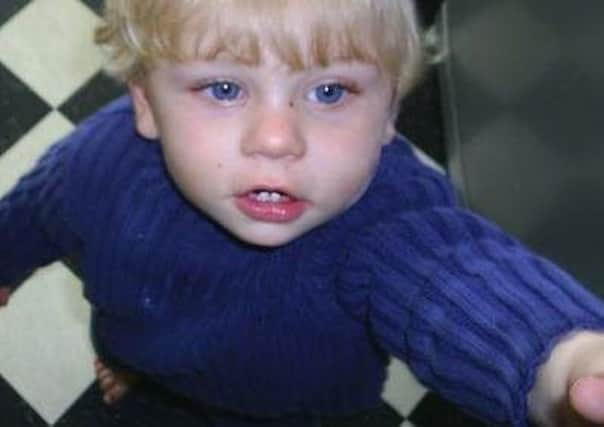Euan McColm: Stop meddling with parents’ children


He is beautiful, of course, because all toddlers are.
We see in their faces both optimism and vulnerability. By nature, they trust us and, by necessity, they depend upon us. Little ones, untouched by cynicism or hatred, are the best of us.
Before we knew his name, the child in that photo was “Baby P”, a boy who died aged just 17 months. For half of his life he had been beaten and tortured. By the time his tiny body could take no more, he had suffered more than 50 injuries.
Advertisement
Hide AdAdvertisement
Hide AdWhen his mother Tracey, her boyfriend Steven Barker, and his brother Jason Owen were convicted of causing or allowing his death, we wanted to know how this terrible crime could have been allowed to happen – and what could be done to stop another child suffering as Peter had.
More than six years after his death, Peter’s story haunts us. Last week I found myself discussing his pitiful life and its cruel end with a number of people, all of whom used it as a reason for their support of the Scottish Government’s proposal to designate for every child born in Scotland a named person to act as a point of contact for any concerns over welfare.
How, they asked, could I oppose such an idea when it could prevent more cases like Baby P’s?
Well, I am opposed to it. And I’m not alone.
Last week the Church of Scotland spoke out against the idea that forms part of the Children and Young People (Scotland) Bill, which reaches its final stage at Holyrood on Wednesday.
After that, unless there is a sudden change of heart from the government, every Scottish child will have a named person – usually a head teacher or health visitor – with legal responsibility to address concerns about their lives from birth until they reach 18 (which means, of course, that some parents will have their own state-appointed named persons while their children do, too).
Those in favour of this move – including some very fine people working for charities dedicated to the protection of children – make a compelling, emotional case for named persons. Too many youngsters, they say, fall through the gap. Problems at home can be missed, danger can go undetected.
Named persons, say supporters, will ensure that the most vulnerable are given the best protection and most effective help possible.
What could be wrong with that? None of us wants to see at-risk children exposed to danger when an intervention could have saved them. None of us wants another child to live and die like Peter Connelly did.
Advertisement
Hide AdAdvertisement
Hide AdBut children – most of them, anyway – already have named persons, responsible for their welfare: their parents.
My grandmother is fond of an old saying: “Everyone’s a bit queer, except me and you. And, come to think of it, you’re a bit queer, too.”
This is as true of families as it is of people. What might seem perfectly normal to you might seem downright odd to someone else. At what stage does a named person think “it’s time I had a word”?
We are assured that named persons will not be there to meddle but to offer support when needed. But the pressure on named persons to cover every base risks intervention when none is required.
The guidelines for named persons include a number of questions which they are expected to ask of themselves which are so vague as to be open to widely different interpretation from individual to individual.
Take the question “do I have all the information I need to help this child or young person?”.
One risk seems to me to be that the parents of a child underperforming at school for a perfectly understandable reason – marital breakdown, say, or bereavement – find themselves put in the position of being asked questions which nobody has a right to ask and nobody should feel compelled to answer.
For named persons, legally charged with responsibility for youngsters, the risk of not interfering may seem far more important than the right of parents to deal with family matters within the family.
Advertisement
Hide AdAdvertisement
Hide AdFamilies have a right to privacy, they have a right not to have their every action monitored, and parents have a right to raise their children as they see fit.
But it is not just the intrusion upon family life threatened by this proposal which should give us cause for concern.
High-profile cases of abuse or neglect almost always see fingers pointed at social workers, some of the most misunderstood and maligned professionals in society. We blame them for doing nothing when all the signs were there, or for doing too little too late.
We do this without giving much consideration to whether social work departments are adequately staffed and resourced. In fact, they never are.
Reverend Sally Foster-Fulton, convener of the Church of Scotland’s Church and Society Council, makes points both about the impact of named persons on families and the dilution of support for children who genuinely need help.
To the Kirk, this legislation diminishes the role of parents with no clear benefit to kids who need help.
Foster-Fulton’s question about how exactly the introduction of named persons will do anything other than reduce the time professionals, such as nurses and school staff, will have to support those most in need demands serious consideration.
I fear the time for that has now passed.
The abuse of any child shames our society and we should ensure that those already working in the field of child protection are fully supported.
Advertisement
Hide AdAdvertisement
Hide AdBut whether named persons will prevent cases like Peter Connelly’s is far from certain. What does seem clearer is that this legislation is more about accountability than welfare. «
Twitter: @euanmccolm